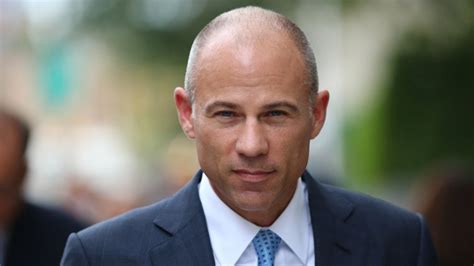
Michael Avenatti, the once high-profile lawyer known for representing Stormy Daniels, has been sentenced to an additional eight years in prison for defrauding her of hundreds of thousands of dollars in book proceeds. The sentence, handed down Monday in federal court in California, will run consecutively to the five years Avenatti is already serving for convictions on fraud and identity theft in New York.
Avenatti Receives Eight-Year Sentence for Stormy Daniels Fraud
Michael Avenatti, already incarcerated for separate fraud and identity theft convictions, received an additional eight-year prison sentence on Monday for defrauding former client Stormy Daniels out of nearly $300,000. The sentence, delivered by U.S. District Judge Cormac Carney in Santa Ana, California, marks a significant downfall for the attorney who once captivated the national spotlight.
Avenatti was convicted in February on wire fraud and aggravated identity theft charges for diverting funds intended for Daniels, a former adult film star, from a book deal. Prosecutors successfully argued that Avenatti had exploited his client’s trust for personal gain, misappropriating funds that were rightfully hers.
“Avenatti abused and exploited Ms. Daniels’ trust, and he betrayed his professional obligations,” said U.S. Attorney Martin Estrada after the sentencing. “This sentence reflects the seriousness of his crimes.”
The new sentence will be served consecutively to the five years Avenatti is already serving, effectively extending his total prison time to 13 years. Judge Carney stated that Avenatti’s conduct warranted a significant punishment, emphasizing the severity of the betrayal and the impact on Daniels.
Details of the Fraudulent Scheme
The case centered on book proceeds Daniels was entitled to receive from her 2018 memoir, “Full Disclosure.” Avenatti negotiated the book deal on Daniels’ behalf, but prosecutors demonstrated that he subsequently directed payments to accounts he controlled without her knowledge or consent.
According to court documents, Avenatti instructed Daniels’ literary agent to send payments to a bank account he controlled, falsely claiming it was his client’s account. He then used the stolen funds for personal and business expenses, including payroll for his law firm, and to cover debts. The total amount defrauded from Daniels was approximately $300,000.
Daniels testified during the trial, recounting her shock and betrayal upon discovering Avenatti’s deception. She described the emotional and financial toll the fraud had taken on her, stating that it eroded her trust in legal professionals.
Avenatti’s Defense and Apology
Avenatti maintained his innocence throughout the trial and sentencing, arguing that he was entitled to keep the money as part of a fee dispute with Daniels. He claimed that Daniels owed him a significant amount for legal services he provided in other matters.
During Monday’s sentencing hearing, Avenatti addressed the court and offered an apology to Daniels, though he continued to downplay the extent of his wrongdoing. He stated that he regretted his actions and expressed remorse for the harm he had caused.
“I am truly sorry for the pain I have caused Ms. Daniels,” Avenatti said. “I made mistakes, and I take full responsibility for my actions.”
However, Judge Carney appeared unmoved by Avenatti’s apology, noting that his actions were deliberate and calculated. The judge emphasized that Avenatti had abused his position of trust and that a substantial sentence was necessary to deter similar conduct in the future.
Impact on Avenatti’s Existing Sentence
Avenatti is currently serving a five-year sentence in a New York prison for convictions on fraud and identity theft related to his representation of other clients. These charges stemmed from allegations that he stole millions of dollars from clients and used the funds for personal and business expenses.
The eight-year sentence imposed in the Daniels case will be served consecutively to the existing five-year sentence. This means that Avenatti will not begin serving the new sentence until he has completed the initial five-year term. The consecutive nature of the sentences effectively extends Avenatti’s total prison time to 13 years.
Stormy Daniels’ Reaction
Stormy Daniels has not yet issued a public statement following Avenatti’s sentencing. However, her attorney, Clark Brewster, told the Associated Press that Daniels was “pleased” with the outcome. He added that the sentence reflected the seriousness of Avenatti’s crimes and provided a measure of justice for his client.
Daniels previously testified that Avenatti’s actions had caused her significant emotional distress and financial hardship. She expressed hope that the legal proceedings would bring closure and allow her to move forward.
Avenatti’s Rise and Fall
Michael Avenatti rose to national prominence in 2018 as the attorney representing Stormy Daniels in her legal battles against then-President Donald Trump. He became a frequent guest on cable news programs, often criticizing Trump and positioning himself as a potential political rival.
Avenatti’s aggressive style and media savvy garnered him both praise and criticism. He was lauded by some as a champion of justice and a fierce advocate for his clients, while others accused him of being a publicity-seeking opportunist.
However, Avenatti’s legal troubles began to mount in 2019, with allegations of fraud, embezzlement, and other misconduct. He was indicted on multiple charges in both California and New York, ultimately leading to his convictions and imprisonment.
Avenatti’s downfall has been swift and dramatic, marking a stark contrast to his earlier success and notoriety. He is now facing a lengthy prison sentence and a tarnished reputation, effectively ending his legal career.
Legal Experts Weigh In
Legal experts have commented on the Avenatti case, highlighting the severity of his crimes and the importance of accountability for attorneys who abuse their positions of trust.
“This case sends a strong message that lawyers who defraud their clients will be held accountable,” said Professor Laurie Levenson of Loyola Law School in Los Angeles. “Avenatti’s actions were a betrayal of the legal profession and a violation of the public trust.”
Other legal experts have noted that Avenatti’s case serves as a cautionary tale for attorneys who prioritize personal gain over their ethical obligations. They emphasized the importance of maintaining integrity and honesty in the practice of law.
Future Legal Challenges
Despite the recent sentencing, Avenatti may face additional legal challenges in the future. He is still under investigation for other alleged misconduct, and it is possible that additional charges could be filed against him.
Avenatti also faces potential disbarment proceedings, which would permanently revoke his license to practice law. The State Bar of California has already initiated disciplinary proceedings against Avenatti, and it is likely that he will be disbarred in the near future.
Conclusion
The sentencing of Michael Avenatti to an additional eight years in prison marks the latest chapter in a remarkable downfall. Once a prominent attorney and media figure, Avenatti is now facing a lengthy prison term for defrauding his clients and violating the public trust. The case serves as a reminder of the importance of ethical conduct in the legal profession and the consequences of abusing positions of power. The consecutive sentencing ensures that Avenatti will spend a considerable amount of time behind bars, reflecting the gravity of his offenses and the impact on his victims, particularly Stormy Daniels. His rise and fall have been closely watched, and his story serves as a cautionary tale within the legal community and beyond.
Expanded Context and Background Information:
Michael Avenatti’s case is more than just a legal proceeding; it’s a study in ambition, hubris, and the consequences of ethical lapses. His journey from a relatively unknown lawyer to a national figure, and then to a convicted felon, highlights the complexities of the legal system and the importance of upholding ethical standards.
Early Career and Rise to Prominence:
Before representing Stormy Daniels, Avenatti had a varied legal career. He worked at a large law firm, handling complex litigation, before starting his own practice. However, it was his representation of Daniels in her dispute with Donald Trump that catapulted him into the national spotlight.
Daniels, whose real name is Stephanie Clifford, claimed that she had an affair with Trump years before he became president and that she was paid hush money to keep silent about it during the 2016 presidential campaign. Avenatti became Daniels’ advocate, aggressively pursuing legal action against Trump and his associates.
His frequent appearances on cable news, coupled with his sharp criticisms of Trump, made him a media sensation. He was often described as a charismatic and articulate advocate, and he quickly amassed a large following on social media. Some even speculated that he might run for president himself.
Ethical Concerns and Red Flags:
Despite his popularity, questions about Avenatti’s ethics and financial dealings began to surface. Reports emerged of unpaid debts, lawsuits from former clients, and allegations of questionable business practices.
Some legal observers raised concerns about his aggressive tactics and his tendency to litigate cases in the media. They argued that he was more interested in self-promotion than in serving his clients’ best interests.
The Stormy Daniels Case: A Deeper Dive:
The case against Avenatti regarding Stormy Daniels revolved around the proceeds from her book, “Full Disclosure.” After negotiating the book deal, Avenatti allegedly instructed Daniels’ agent to send payments to an account he controlled. He then used those funds for his own purposes, without Daniels’ knowledge or consent.
The prosecution presented evidence that Avenatti had diverted nearly $300,000 from Daniels. This included payments that were supposed to go to her for royalties and other compensation. Avenatti argued that he was entitled to keep the money due to a fee dispute, but the jury rejected this defense.
Daniels testified during the trial, describing how she felt betrayed by Avenatti, whom she had trusted to protect her interests. She said that his actions had caused her significant emotional distress and financial hardship.
The New York Fraud and Identity Theft Case:
In addition to the Daniels case, Avenatti was also convicted of fraud and identity theft in New York. These charges stemmed from his representation of other clients.
Prosecutors alleged that Avenatti had stolen millions of dollars from his clients and used the funds to prop up his failing law firm and to pay for personal expenses. He was accused of using false documents and misleading his clients about the status of their cases.
The New York case involved multiple victims, including a paraplegic man who was awarded a large settlement in a personal injury case. Avenatti allegedly stole a significant portion of the settlement money, leaving the man in a difficult financial situation.
Consecutive Sentencing and Its Implications:
The decision to sentence Avenatti to eight years in prison, to be served consecutively to his existing five-year sentence, is significant. A consecutive sentence means that the two sentences are served one after the other, rather than at the same time (concurrently).
This effectively increases Avenatti’s total prison time to 13 years. The judge in the Daniels case cited the severity of Avenatti’s conduct and the need to deter others from engaging in similar behavior as justification for the consecutive sentence.
The consecutive sentence reflects the seriousness with which the courts view Avenatti’s crimes. It sends a message that attorneys who abuse their positions of trust and defraud their clients will face severe consequences.
The Role of the Media in Avenatti’s Downfall:
The media played a significant role in Avenatti’s rise and fall. His frequent appearances on cable news and his active presence on social media helped him to gain national attention and to build a following.
However, the media also scrutinized his ethical and financial dealings, which ultimately led to his downfall. Investigative journalists uncovered reports of unpaid debts, lawsuits, and allegations of misconduct.
The media coverage of Avenatti’s legal troubles helped to raise awareness of his alleged crimes and to hold him accountable for his actions.
The Broader Impact on the Legal Profession:
Avenatti’s case has had a broader impact on the legal profession. It has raised questions about the ethical standards of lawyers and the importance of oversight and accountability.
Many legal organizations and bar associations have used the Avenatti case as an opportunity to remind lawyers of their ethical obligations and to provide training on how to avoid similar situations.
The case has also led to calls for increased regulation of the legal profession and for stricter enforcement of ethical rules.
Avenatti’s Future:
Avenatti’s legal troubles are far from over. In addition to his prison sentence, he faces potential disbarment proceedings and ongoing investigations into other alleged misconduct.
It is likely that he will spend a significant portion of his life in prison. Even after his release, he will likely face challenges in rebuilding his career and his reputation.
Avenatti’s story serves as a cautionary tale about the dangers of ambition and the importance of upholding ethical standards. It is a reminder that even the most successful and charismatic individuals can fall from grace if they fail to adhere to the rules and regulations of the legal profession.
The Psychology of Avenatti’s Actions:
Understanding Avenatti’s motivations requires delving into the potential psychological factors at play. His rapid ascent to fame likely fueled a sense of invincibility and a belief that he was above the law. This, combined with possible narcissistic tendencies, could have contributed to his reckless behavior and disregard for ethical boundaries. The allure of wealth and power may have further clouded his judgment, leading him down a path of fraud and deceit. Analyzing these psychological aspects offers a deeper understanding of why a lawyer who once championed justice could so dramatically deviate from it. The case also highlights how ego and unchecked ambition can corrupt even the most promising individuals.
The Victims’ Perspective:
While Avenatti’s legal battles and personal downfall have dominated headlines, it’s crucial to remember the victims of his crimes. Stormy Daniels, who sought Avenatti’s help, instead became a target of his fraud. Her testimony revealed the deep sense of betrayal she experienced, highlighting the emotional and financial toll his actions took on her life. Similarly, the other clients Avenatti defrauded suffered significant losses, impacting their livelihoods and trust in the legal system. Their stories underscore the devastating consequences of Avenatti’s actions and the importance of holding him accountable for the harm he inflicted. Their experiences serve as a stark reminder that behind every high-profile legal case, there are real people whose lives are directly affected.
The Legal System’s Response:
The legal system’s handling of Avenatti’s case demonstrates its commitment to upholding justice and protecting the public from unscrupulous lawyers. The thorough investigations, trials, and subsequent convictions highlight the checks and balances in place to ensure accountability. The consecutive sentencing, in particular, sends a strong message that such egregious violations of trust will not be tolerated. Furthermore, the potential disbarment proceedings underscore the legal profession’s commitment to maintaining ethical standards and removing individuals who fail to uphold them. This case serves as a testament to the legal system’s ability to address misconduct and deliver justice, even when it involves high-profile figures.
FAQ:
1. What exactly was Michael Avenatti convicted of in the Stormy Daniels case?
Avenatti was convicted of wire fraud and aggravated identity theft for defrauding Stormy Daniels of approximately $300,000 in book proceeds. He diverted funds intended for Daniels to accounts he controlled without her knowledge or consent.
2. How does this new sentence affect Avenatti’s existing prison term?
The eight-year sentence will be served consecutively to the five-year sentence Avenatti is already serving for fraud and identity theft convictions in New York. This effectively extends his total prison time to 13 years. “The sentence imposed in the Daniels case will be served consecutively to the existing five-year sentence. This means that Avenatti will not begin serving the new sentence until he has completed the initial five-year term. The consecutive nature of the sentences effectively extends Avenatti’s total prison time to 13 years.”
3. What was Avenatti’s defense in the Stormy Daniels case?
Avenatti argued that he was entitled to keep the money as part of a fee dispute with Daniels, claiming she owed him a significant amount for legal services he provided in other matters. However, the jury rejected this defense.
4. What has been Stormy Daniels’ reaction to Avenatti’s sentencing?
While Stormy Daniels has not issued a public statement, her attorney, Clark Brewster, told the Associated Press that Daniels was “pleased” with the outcome. He added that the sentence reflected the seriousness of Avenatti’s crimes and provided a measure of justice for his client.
5. What are some of the potential future legal challenges Avenatti may face?
Avenatti may face additional legal challenges, including ongoing investigations into other alleged misconduct and potential disbarment proceedings that would permanently revoke his license to practice law. The State Bar of California has already initiated disciplinary proceedings against him.









